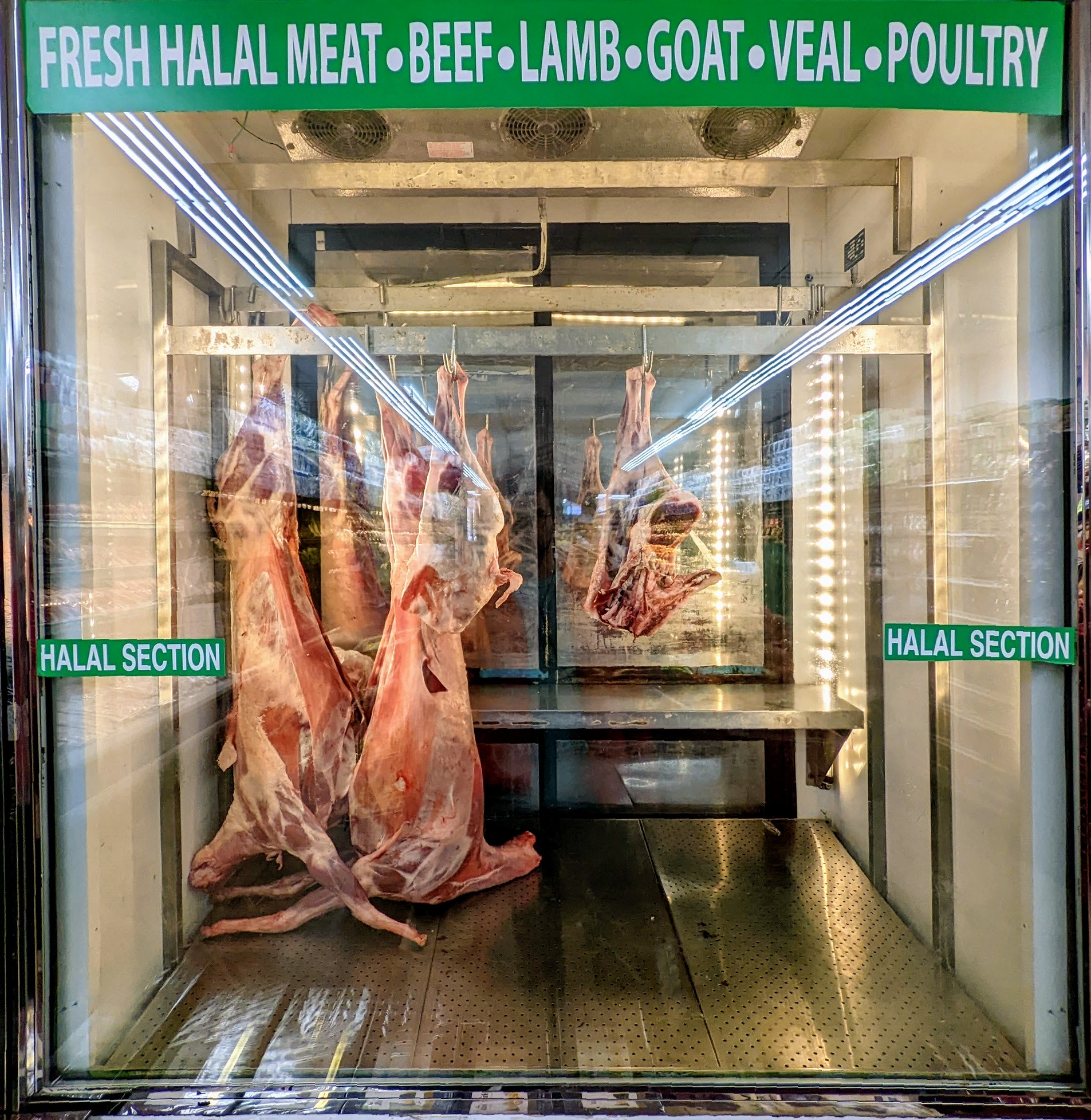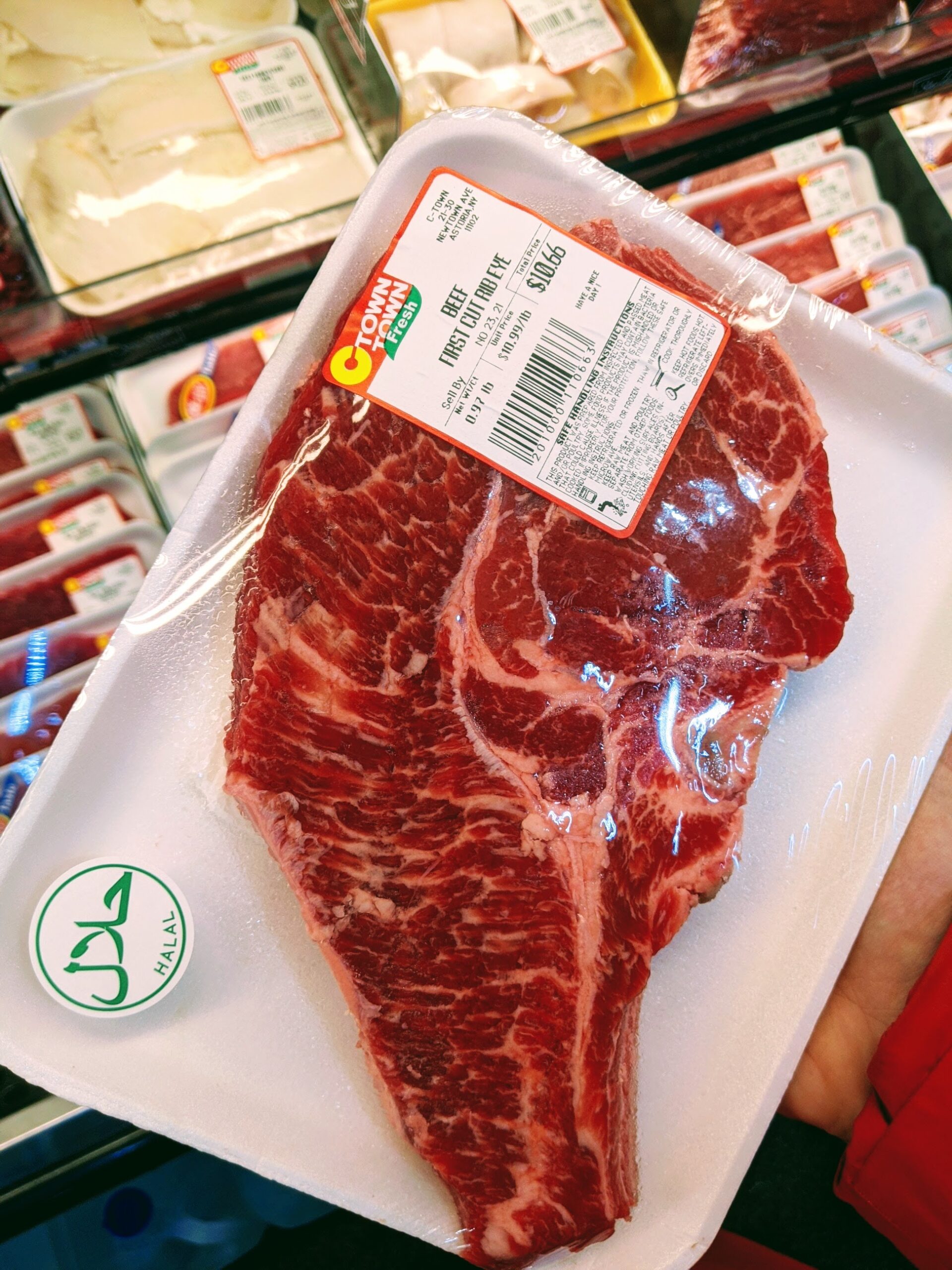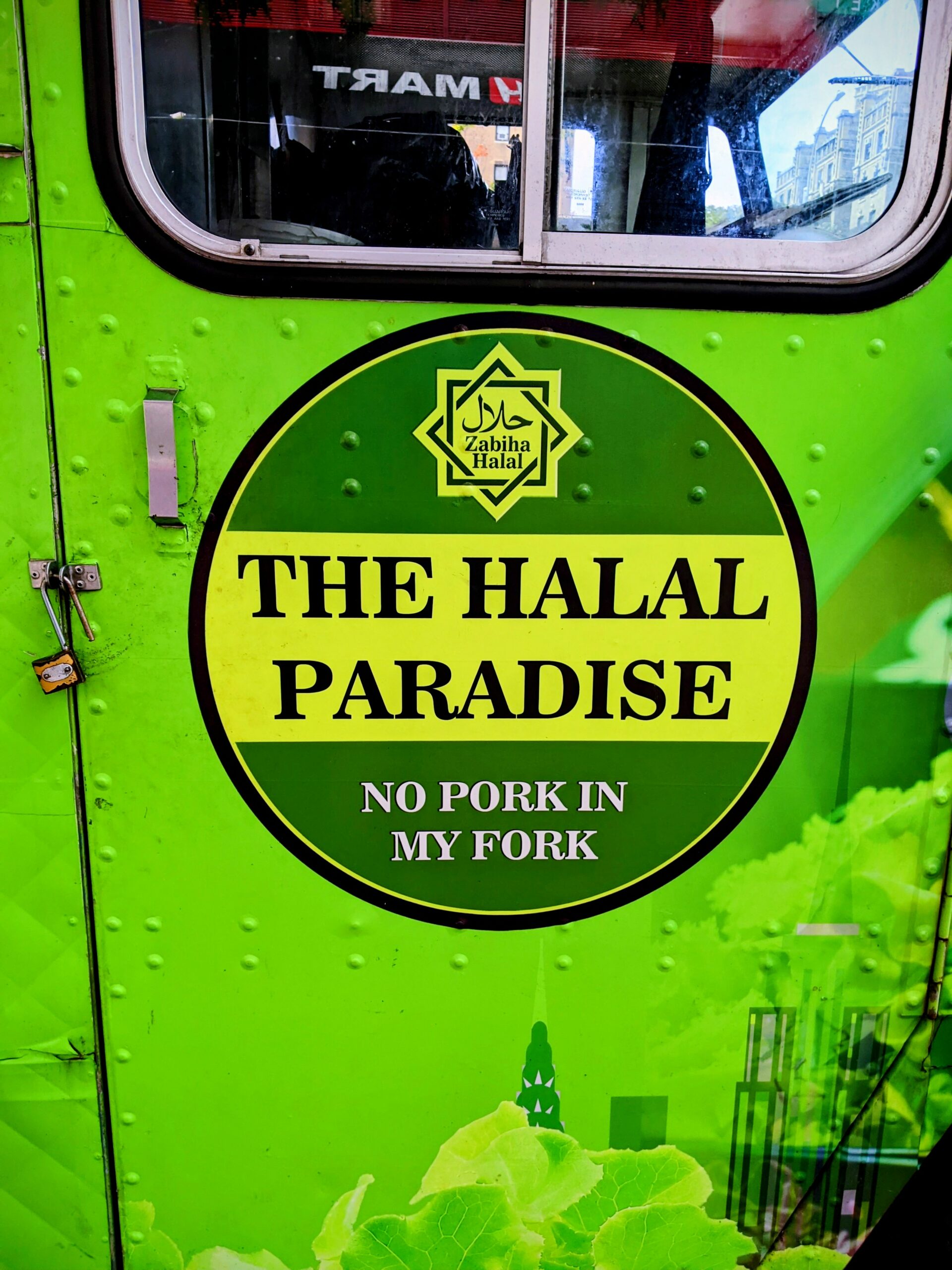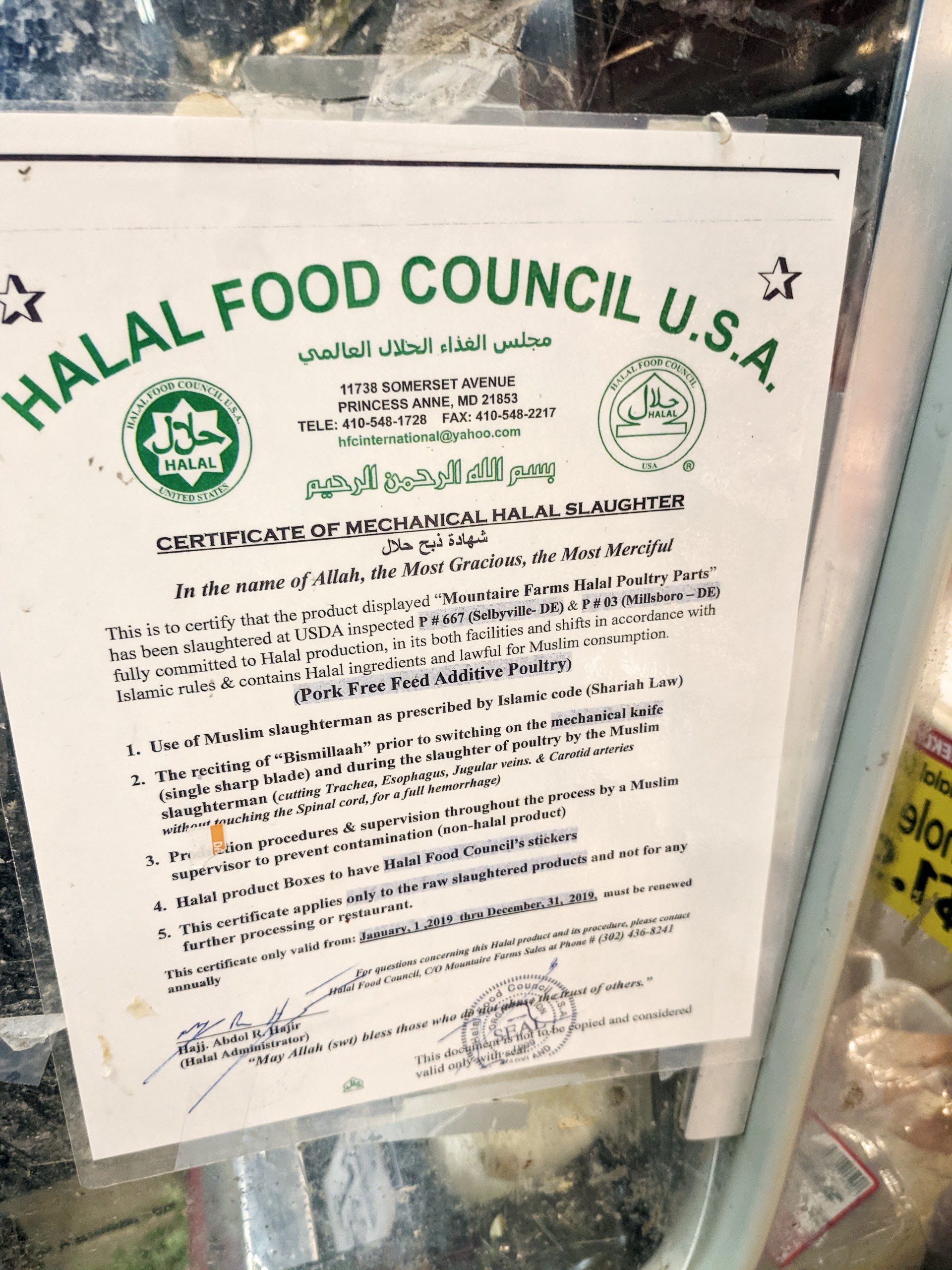WHO DEFINES HALAL IN AMERICA?
Muslims around the US often pay higher prices for meat that’s labeled as ‘halal,’ but a lack of federal regulation on what the ‘halal’ label should stand for leads to questions about the likelihood of fraudulent labeling.

When Muslims around the country go to purchase halal meat, they often have to rely on a round, green-colored sticker with the label ‘halal’ written on it. Unlike the USDA labels for ‘organic’ or ‘prime,’ however, there is little to no governmental oversight over what that green ‘halal’ sticker actually signals for consumers, leaving them increasingly vulnerable to labeling fraud.
Over the past few decades, halal food has become a $20 billion industry in the US. Despite the increasing demand for halal food in the country, the industry still remains a largely unregulated one and susceptible to fraud. According to a 2020 study by Food Safety Net Services, halal food as a whole is the fourth most susceptible to fraud in the entire country.
The halal label is still a relatively new construct in the US. “Up until about 15 years or so ago, there wasn't such a thing as a halal certification in the United States,” says Kelsey Hopkins, a PhD candidate at Michigan State University specializing in halal food fraud. “If someone was to be offering a halal product in the 1980s or 1990s in any part of the US it was based more on word of mouth and trust in your retailer or processor.”

Back in the 1980s, trying to find halal meat in stores was a very different experience for Muslims in the US. According to Omar Wali, the president of a halal meat wholesaler based in Virginia, the process to procure halal meat back then was a long and arduous one. If someone ran a halal meat store at the time, he says, they would have to get into a van, drive to a nearby slaughterhouse, then pick out livestock, slaughter the meat themselves, then take the meat back into their van, and only then would they be able to stock halal meat in their stores.
Today, since the demand for halal meat has increased so much over the years, many companies have popped up that aim to supply Muslim customers with halal meat. However, while they may put a halal label on their products and sell them at a markup, they face little government supervision that ensures whether the products they are selling as halal are actually halal.

In response to this lack of federal oversight, several states across the US have passed laws in recent years to try and regulate who is able to present a product as ‘halal’ in the state. Here in New York, for example, Muslim community members pushed the State Assembly to pass the Halal Foods Protection Act in 2005, requiring businesses selling halal food to provide certification. However, while the law gives the state the authority to ensure businesses selling halal meat have valid certification, it cannot define what the certification actually stands for.
The main enforcement mechanism is supposed to be “individuals, partnerships, associations, or organizations” who register themselves as certifying authorities; these are the people who have the legal authority to say whether something qualifies as “halal” or not.
In order to oversee this certification process, New York State’s Department of Agriculture and Markets runs a division called the Division of Halal Law Enforcement that approves who qualifies as a certifier. According to a spokesperson from the Department, the division only has one full-time staff member who is responsible for overseeing both the halal and kosher registration programs for the entire state, but the department is able to call upon the team of statewide food inspectors to assist when required. The certifiers registered in the ‘New York State Halal Food Registry’ include an assortment of mosques, community centers, and national certification agencies, as well as a few individuals.

Back in 2010, the USDA got a tip to look into an Iowa-based halal meat processor called Midamar for putting halal stickers on meat that arrived from non-halal facilities. Over the course of their investigation, they indicted Midamar—one of the oldest halal food companies in the US and one of the first to export American meat products to the Middle East and Southeast Asia—on multiple counts of fraud.
“About 5 million dollars worth of beef was purposefully mislabeled as halal when it was not halal,” says Hopkins, “and whoever was in charge of that at Midamar's plant purposely allowed it to be mislabeled, [and] forged the documents.”
Midamar gets its halal certification from a certification body known as Islamic Services of America or ISA. When the federal government went after Midamar for fraudulent labeling, it also went after the certification body that was meant to oversee whether Midamar’s products were meeting the halal criteria. However, the certification agency’s oversight was not the only reason the government went after ISA. ISA it turned out was also co-founded by Midamar’s owners and found to be complicit in the fraud. William “Bill” Aossey Jr., a prominent Iowa businessman and a descendant of some of the oldest Muslim immigrants in Iowa, is the founder of both Midamar and ISA; his son, Jalel Aossey, serves as President of ISA.
“You can have a law on the books, but if no one is enforcing it... it's not gonna be upheld in the way it should.”
According to the US Attorney’s Office in the Northern District of Iowa, Midamar and ISA employees collaborated to fabricate USDA export documents and health certificates, while ISA provided the certification that the products themselves reached halal criteria. Aossey, his son, Midamar, and ISA eventually were all eventually found guilty; 75-year-old Bill Aossey was sentenced to two years imprisonment and a $60,000 fine, while his son pleaded guilty and was forced to divest any interest in Midamar and banned from being associated with the business or operations of Midamar.
According to Hopkins, laws like New York State’s Halal Foods Protection Act can only work if they have the proper backing and support. “You can have a law on the books, but if no one is enforcing it,” says Hopkins. “If there's not enough state or federal funds to fund the program to make sure people are going out and doing the job that's necessary to uphold those standards, then it's not gonna be upheld in the way it should.”